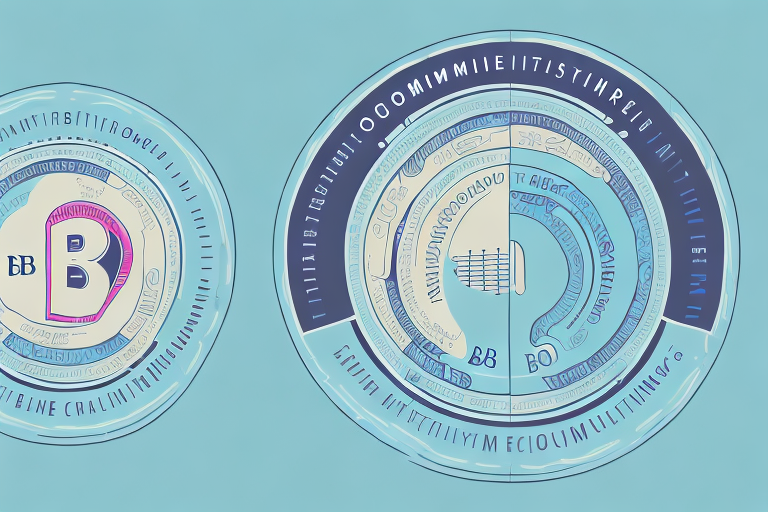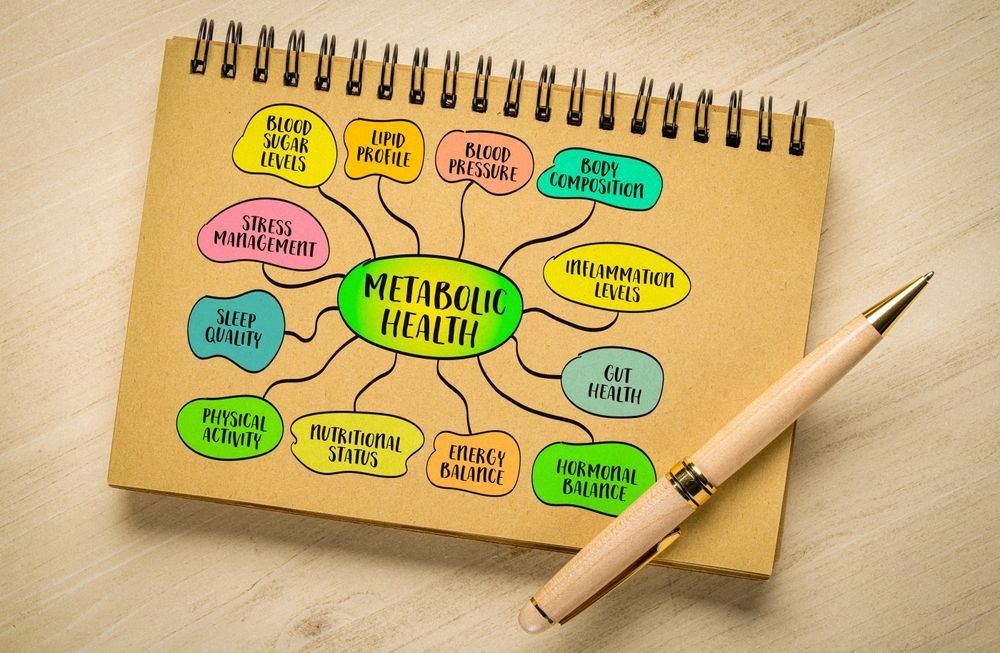Comparing B Complex and B12: Which Is Best for You?

When it comes to choosing a vitamin supplement, the options can be overwhelming. Two popular choices are B complex and B12. But which one is right for you? Let's take a closer look at these vitamins and compare their benefits, side effects, and more.
Understanding B Vitamins
Before we delve into B complex and B12, it's important to understand what B vitamins are and what role they play in the body.
B vitamins are a group of water-soluble vitamins that are essential for various bodily functions. They help to convert food into energy, which is necessary for the proper functioning of the body. These vitamins are also important for maintaining healthy skin, hair, and eyes, as well as for proper brain and nervous system function.
There are eight different types of B vitamins, each with its own unique set of benefits:
- B1 (thiamin): Helps to convert food into energy and is important for proper nerve and muscle function.
- B2 (riboflavin): Helps to break down carbohydrates, proteins, and fats and is important for maintaining healthy skin and eyes.
- B3 (niacin): Helps to lower cholesterol levels and is important for maintaining healthy skin, nerves, and digestion.
- B5 (pantothenic acid): Helps to break down carbohydrates, proteins, and fats and is important for maintaining healthy skin, hair, and eyes.
- B6 (pyridoxine): Helps to produce red blood cells and is important for proper brain function and the synthesis of hormones and neurotransmitters.
- B7 (biotin): Helps to break down carbohydrates, proteins, and fats and is important for maintaining healthy skin, hair, and nails.
- B9 (folate): Helps to produce red blood cells and is important for proper fetal development during pregnancy.
- B12 (cobalamin): Helps to produce red blood cells and is important for proper nerve function and DNA synthesis.
The Benefits of B Vitamins
B vitamins offer a wide range of benefits for the body. They are essential for maintaining good health and preventing various health conditions. Some of the benefits of B vitamins include:
- Improved energy levels: B vitamins help to convert food into energy, which can help to improve energy levels and reduce fatigue.
- Healthy skin, hair, and nails: B vitamins are important for maintaining healthy skin, hair, and nails.
- Improved brain function: B vitamins are important for proper brain function, including memory and concentration.
- Reduced risk of birth defects: B vitamins, particularly folate, are important for proper fetal development during pregnancy and can help to reduce the risk of birth defects.
- Reduced risk of heart disease: B vitamins, particularly B6, B9, and B12, can help to lower homocysteine levels in the blood, which is a risk factor for heart disease.
Overall, B vitamins are essential for maintaining good health and preventing various health conditions. It's important to ensure that you are getting enough B vitamins in your diet or through supplements.
What is B Complex?
B complex is a supplement that combines all of the B vitamins into one convenient pill. The B vitamins are a group of essential nutrients that are important for maintaining good health. They play a role in many bodily functions, including energy production, metabolism, and the formation of red blood cells.
The B vitamins are water-soluble, which means that they are not stored in the body and must be replenished regularly through diet or supplements. B complex supplements are a popular way to ensure that you are getting enough of these important nutrients.
Components of B Complex
The exact makeup of B complex can vary depending on the manufacturer, but it typically includes all eight B vitamins in varying amounts. These vitamins are:
- Thiamine (B1)
- Riboflavin (B2)
- Niacin (B3)
- Pantothenic acid (B5)
- Pyridoxine (B6)
- Biotin (B7)
- Folate (B9)
- Cobalamin (B12)
Each of these vitamins has its own unique benefits and functions within the body. For example, thiamine is important for energy production and nerve function, while folate is necessary for healthy cell growth and development.
Benefits of B Complex
B complex is known for its energy-boosting properties and its ability to support healthy skin, hair, and nails. It also plays a role in maintaining a healthy immune system and proper brain function.
Many people take B complex supplements to help with fatigue or to improve their mood and cognitive function. Some studies have also suggested that B vitamins may help to reduce the risk of certain chronic diseases, such as heart disease and dementia.
Possible Side Effects and Interactions
While B complex is generally safe for most people, it can cause side effects such as nausea, vomiting, and diarrhea in some individuals. It can also interact with certain medications, so it's important to talk to your doctor before taking it.
If you are pregnant or breastfeeding, you should also talk to your doctor before taking B complex supplements, as some of the vitamins may be harmful in high doses.
In general, it's best to get your B vitamins from a healthy, balanced diet that includes plenty of whole grains, fruits, vegetables, and lean proteins. However, if you are unable to get enough B vitamins through your diet, a B complex supplement may be a good option to ensure that you are meeting your daily needs.
What is Vitamin B12?
Vitamin B12 is one of the eight B vitamins, also known as cobalamin. It is a water-soluble vitamin that is essential for the proper functioning of the body. It is unique because it is not found in plants, but rather in animal products such as meat, fish, and dairy.
While the body only needs small amounts of vitamin B12, it plays a crucial role in many bodily functions. It is responsible for the production of red blood cells and DNA, and it helps maintain healthy nerve cells. It also plays a role in the metabolism of fatty acids and amino acids.
The Importance of Vitamin B12
Vitamin B12 is essential for the production of red blood cells, which carry oxygen throughout the body. Without enough vitamin B12, the body can become anemic, leading to fatigue, weakness, and shortness of breath.
Vitamin B12 is also important for the proper functioning of the nervous system. It helps maintain the myelin sheath that surrounds and protects nerve cells, and it is involved in the production of neurotransmitters that regulate mood and cognitive function.
Benefits of Vitamin B12
Vitamin B12 is particularly important for vegetarians and vegans, who may not get enough of it from their diets. It is also important for older adults, who may have difficulty absorbing vitamin B12 from food.
In addition to its role in red blood cell production and nervous system function, vitamin B12 has been shown to have other health benefits. It can improve energy levels, boost metabolism, and aid in weight loss. It may also help prevent heart disease and improve bone health.
Possible Side Effects and Interactions
Like other B vitamins, vitamin B12 is generally safe for most people when taken in recommended amounts. However, taking high doses of vitamin B12 supplements can cause side effects such as headaches, dizziness, and nausea.
Vitamin B12 can also interact with certain medications, including some antibiotics and medications used to treat acid reflux and diabetes. If you are taking any medications, it is important to talk to your doctor before taking vitamin B12 supplements.
In conclusion, vitamin B12 is an essential nutrient that plays a crucial role in many bodily functions. While it is important to get enough of it from your diet, supplements can be helpful for those who are at risk of deficiency.
Comparing B Complex and B12
When it comes to B complex and B12, it can be hard to know which one is better for you. Both offer important benefits, but they differ in some key ways.
First, let's take a closer look at B complex. As the name suggests, this supplement contains all eight B vitamins, including thiamin, riboflavin, niacin, pantothenic acid, pyridoxine, biotin, folate, and of course, B12. Each of these vitamins plays a unique role in the body, from converting food into energy to supporting healthy skin and hair.
While B complex can be a great way to ensure you're getting all of the B vitamins you need, it's important to note that not everyone requires the same amount of each vitamin. For example, some people may need more biotin to support healthy hair and nails, while others may need more folate if they're pregnant or planning to conceive.
Now let's turn our attention to B12. This vitamin is particularly important for vegetarians and vegans, who may not get enough of it from their diets. B12 is found naturally in animal products like meat, fish, and dairy, so those who don't consume these foods may need to supplement to ensure they're getting enough of this vital nutrient. B12 is also important for maintaining healthy nerve cells and DNA.
Key Differences and Similarities
So, what are the key differences and similarities between B complex and B12? As we've already discussed, the main difference is that B complex contains all eight B vitamins, while B12 is just one of them. However, both supplements can be used to support overall health and energy.
Another similarity between the two is that they're both water-soluble vitamins, which means that they're not stored in the body and need to be replenished regularly. This also means that it's difficult to overdose on these vitamins, as any excess is simply excreted in the urine.
Which One is Right for You?
So, which one should you choose: B complex or B12? The answer depends on your individual needs. If you're looking for a general supplement to support overall health and energy, B complex might be a good choice. It can help ensure you're getting all of the B vitamins you need in the right amounts.
However, if you're a vegetarian or vegan or you're specifically looking to boost your B12 levels, then vitamin B12 might be the better option. It's important to talk to your doctor or a registered dietitian to determine the right supplement and dosage for you.
No matter which supplement you choose, it's important to remember that it's just one piece of the puzzle when it comes to maintaining good health. A balanced diet, regular exercise, and good sleep habits are all important factors in overall wellness.
How to Choose the Right Supplement
Regardless of which supplement you choose, there are a few factors to consider. In this article, we'll explore some of the key factors to consider when choosing a supplement, as well as some tips for finding a high-quality supplement.
Factors to Consider
First and foremost, consider your individual needs and goals. Are you looking for a general multivitamin to support overall health and wellness, or are you looking to address a specific deficiency or health concern? For example, if you're a vegan, you may need to supplement with vitamin B12, as this nutrient is primarily found in animal products.
Another factor to consider is the dosage and form of the supplement. Some people may prefer a liquid or sublingual form of B12, while others may prefer a pill or capsule. Additionally, some supplements may contain higher or lower dosages of certain nutrients, so it's important to talk to your doctor to determine the right dosage for you.
Recommended Dosages
The recommended daily intake for most B vitamins is around 2-3 mg per day, though this can vary depending on age, sex, and other factors. For example, pregnant women may need higher doses of certain nutrients to support fetal development. Your doctor can help you determine the right dosage for your individual needs.
Tips for Finding a Quality Supplement
When choosing a supplement, it's important to look for one that is third-party tested and certified. This ensures that the supplement contains the ingredients and dosages listed on the label. Additionally, look for supplements that are made by reputable companies with a track record of producing high-quality products. You may also want to check online reviews and ratings to see what other users have to say about the product.
Another tip is to look for supplements that contain natural, whole-food ingredients. Synthetic nutrients may not be absorbed as well by the body, and may even be harmful in high doses. Additionally, look for supplements that are free from artificial colors, flavors, and preservatives.
Lastly, consider the price of the supplement. While you don't want to skimp on quality, you also don't want to overspend on a supplement that may not be worth the cost. Look for supplements that offer a good value for the price, and consider signing up for a subscription service to save money on future orders.
Conclusion: Making the Best Choice for Your Health
When it comes to choosing between B complex and B12, there is no one-size-fits-all answer. The right choice depends on your individual needs and goals. Consider consulting with a healthcare professional to determine the right supplement and dosage for you.










